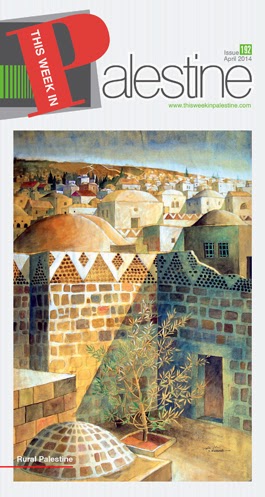Israel is used to
indulgence
from the West, but it’s beginning to experience unexpected and
uncomfortable forms of pressure. The Palestinians are used to being
pressured by the West regarding Israel, but not on internal governance.
It’s high time for a period of “tough love” for both, and this seems to
have begun. It’s in everyone’s interests.
Israel has been trying to get into the US visa waiver
programme, meaning that citizens of Israel wouldn’t need a visa to enter the United States. But US
law requires that American citizens
must receive the same treatment. And it’s been clear for decades that
Israel discriminates against Palestinian and other Arab Americans.
This was acknowledged by the state department last week when
spokeswoman Jen Psaki noted: “The department of homeland security and
state remain concerned with the unequal treatment that Palestinian
Americans and other Americans of Middle Eastern origin experience at
Israel’s border and checkpoints, and reciprocity is the most basic
condition of the visa waiver
programme.”
In other words, the Obama administration is not going to make Israel
an exception in allowing it to discriminate against American citizens
on the basis of their ethnicity, religion or national origin.
There
has been a recent spike in the number of rejections of Israeli visa
applications. In the House of Representatives, a bill that effectively
exempted Israel from the reciprocity clause languished. Instead, in
January, the committee on foreign affairs adopted the “US-Israel
Strategic Partnership Act of 2013”, which requires Israel to “satisfy”
and “continue to satisfy” section 217 of the Immigration and Nationality
Act for inclusion in the visa waiver
programme. This requires “reciprocal privileges” for Americans.
The position of the state department and department of homeland
security on Israel’s well-documented discrimination against Palestinians
and other Arab Americans means it clearly wouldn’t qualify under the
House bill.
Legislation
pending in
the Senate incoherently contains language that would both require
Israel to comply with Section 217 and simultaneously be allotted a
special dispensation to discriminate against Americans. Given the
position of the House and the administration, it now seems almost
certain that Israel’s efforts to get the United States to wink at its
undeniable record and practice of discriminating against Palestinian and
Arab Americans just isn’t going to happen.
The apparent collapse of efforts to include Israel in the US visa waiver
programme is
only the latest instance of what might be termed “tough love” coming
from its western allies. This particular instance is pursuant to
American anti-discrimination legislation and the rights of all
Americans.
But many recent comments from both Barack Obama and John Kerry, the
US secretary of state, have been much more blunt about the dangers
facing Israel in the event of a collapse of peace talks with the
Palestinians, and the limitations of what the US might be able, or
implicitly interested, in doing to prevent the “international fallout.”
Among the key examples of this is an even “tougher” form of “love”
coming from the European Union and individual European states, who are
beginning to put substance into their long-standing policies objecting
to Israel’s illegal settlement project.
They have already insisted that multilateral and public sector
projects don’t include funding or support for any settlements. And
Germany, Israel’s closest friend in Europe, is pushing to extend those
restrictions to bilateral and private sector projects in any territories
“not under Israel’s jurisdiction before June 1967”. If that happens,
most other European countries will quickly follow suit.
For their own purposes, both the Boycott, Divestment and Sanctions
movement (BDS) that seeks to target Israel as a whole rather than the
occupation and settlements, and the Israeli government are trying to
conflate the emerging European policy with BDS.
Benjamin Netanyahu spent a good deal of his recent speech at the American pro-Israel
organisation AIPAC
doing just that, with the overt purpose of making Europe’s actions seem
anti-Israel, if not anti-Semitic. But in truth, the two are totally
unconnected and pursuant to different goals.
Whatever BDS activists may imagine, European statesmen don’t read
their blogs or Twitter feeds, and are not inspired by their rhetoric.
The Europeans are pursuing the logic of their own policies and – since
the United States
does not appear to object to any of this – also potentially giving the Americans at least additional rhetorical leverage with Israel.
Europe’s policies aren’t anti- Israel. They are pro-peace and
pursuant to international law. This is friends doing what friends should
do: helping each other see what’s in their best interests and refusing
to cooperate with self-destructive
behaviour.
The Palestinians, too, require some “tough love.” The “love” they
need is much greater aid and technical support from the West and the
Arab world.
The “tough” part would be for the donor community to
demand, as they can and should, that Palestinian advancements in recent
years in good governance, transparency and
security professionalism –
many of which have frayed over the past 12 months – be at least
restored to their former standards. The Palestinian people clearly want
effective and accountable governance, and the donor community has unique
leverage to help them ensure they get it.
The Palestinians and Israelis need their friends to help them
achieve peace. But, like everyone, they also need their friends to help
keep them honest. That’s what real friends do.
Hussein Ibish is a senior fellow at the American Task Force on Palestine, a columnist for Now Media and blogs at www.ibishblog.com. On Twitter: @ibishblog.
















